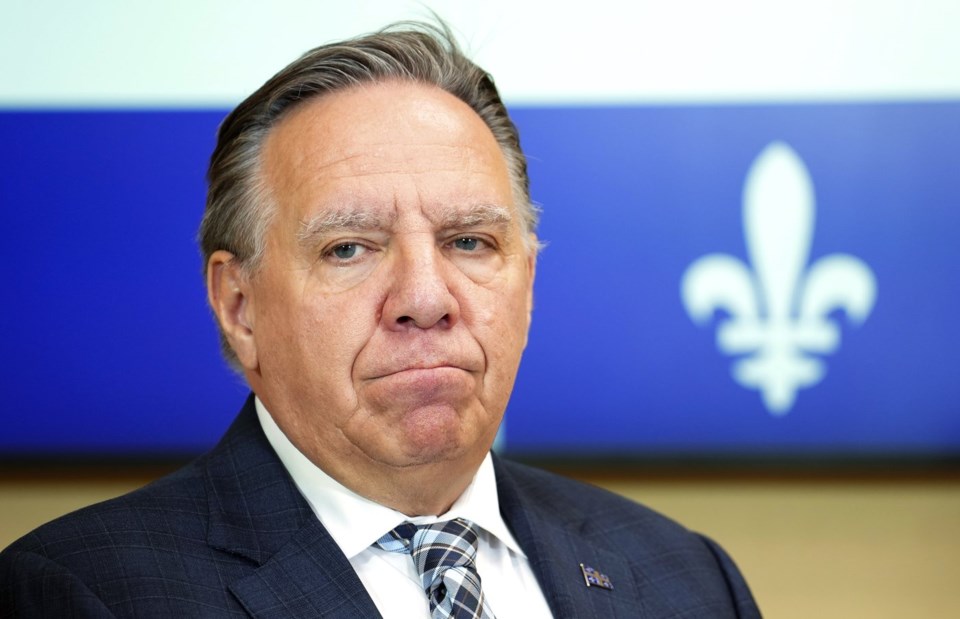MONTREAL — A prominent polling analyst says Quebec's governing party would be reduced to fewer than 10 seats in the provincial legislature if an election were held today, based on current poll numbers.
Philippe J. Fournier, creator of poll aggregator 338Canada, says Premier François Legault's approval rating is now worse than that of Prime Minister Justin Trudeau, which recent polls have pegged around 30 per cent.
A Pallas Data poll released Monday for 338Canada and L'Actualité magazine suggests a majority of Quebecers think Legault should step down before the next provincial election in 2026, and only one in five respondents are satisfied with his performance.
"We have in Quebec a premier who not long ago could almost walk on water," Fournier said in an interview. "And the confidence, the link that he had with many voters in Quebec is utterly broken right now."
Legault won a second term in 2022, when his party secured 90 of 125 seats — the largest majority Quebec had seen in decades. But the centre-right party he co-founded in 2011, the Coalition Avenir Québec, has been lagging behind the sovereigntist Parti Québécois in opinion polls for more than a year.
Fournier said he was surprised Legault's numbers are as bad as they are. "Twenty per cent satisfaction is incredibly low for a party that won 90 seats two years ago," he said. "Usually a premier or a prime minister with such numbers, when they're in the second mandate, there is no coming back."
The poll showed 53 per cent of respondents think Legault should not seek a third mandate, with fairly consistent results across age groups and regions of the province. Fournier pointed out that the 33 per cent of respondents who said Legault should stay on include Parti Québécois and Liberal voters who may want him to seek re-election because they think he's weak.
Fournier drew parallels between Legault and Trudeau, whose Liberal party is trailing the Conservatives by a wide margin in the polls. "I see two men who were extremely popular at the peak of their powers, and then they had to go through the pandemic," he said. "The post-pandemic world that we have, I think we're still destabilized. I think inflation is going down, but it hurt a lot of people, and so whoever is in charge, they will be blamed for it. Many incumbents are falling right now."
Many observers point to Legault's decision last year to abandon plans to build motorists a tunnel between Quebec City and suburbs south of the St. Lawrence River as the beginning of his downward spiral. The government promised to revive the project after losing a Quebec City byelection last fall.
He has since taken heat for other controversial decisions, including a plan to spend up to $7 million to lure the NHL's Los Angeles Kings to play two pre-season games in Quebec City in October.
But Fournier said that where voters in the rest of Canada might blame Ottawa for inflation and the cost of living, Quebecers are more likely to direct their ire toward the provincial government. "They're not pointing at Justin Trudeau, they're pointing at François Legault," he said.
Fournier said seat projections he's releasing later this week will show the Coalition Avenir Québec in single-digit territory. "If the numbers are still like this (in a year), not only is he heading toward defeat, but it will be a crushing defeat," he said, adding that he believes Legault will either step down or be pushed out if the polls don't change.
Legault has said he will run again in 2026. Antonine Yaccarini, a political analyst and former PQ and CAQ staffer, said U.S. president-elect Donald Trump's threats to slap tariffs on products from Canada could be an opportunity for the premier to create a "common front" with leaders across the country to look for solutions. "When we face a crisis, it can have a rallying effect around a leader," she said.
But she said Legault has often been too quick to react to negative headlines. Earlier this year, for example, he abruptly announced that his party would no longer accept donations amid cash-for-access allegations. "So there is a bit of this tendency to rush, and to react to what is in the media very, very quickly," she said, adding that the premier needs to be more focused and disciplined.
Yaccarini said it's difficult to predict what the political landscape would look like in Quebec if Legault were to step aside, since he created the party in his image. "It's a coalition of people, some who are former separatists, others who are more federalist," she said. "So depending on who will carry the CAQ in the future, it could have a huge impact on their positions."
The Quebec Liberal Party, which currently forms the official Opposition, is set to launch a leadership race in January. It remains to be seen what direction the party will take under new leadership, Yaccarini said.
The Pallas Data poll surveyed 1,093 adults by phone last week, and has a margin of error of three percentage points, 19 times out of 20.
This report by The Canadian Press was first published Dec. 2, 2024.
Maura Forrest, The Canadian Press




